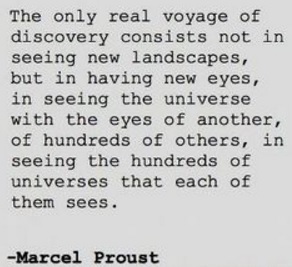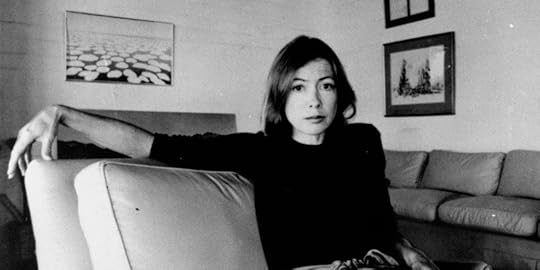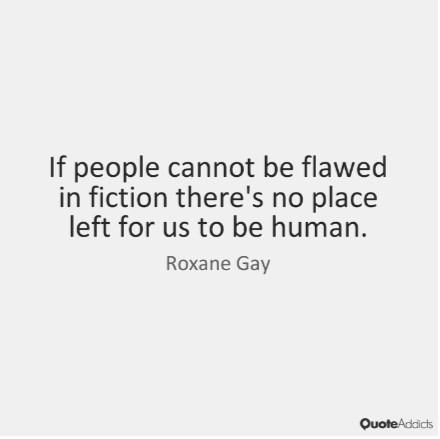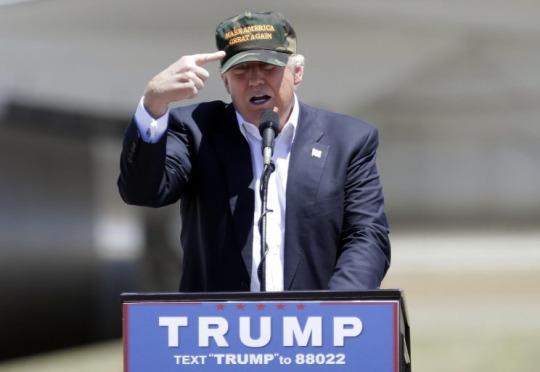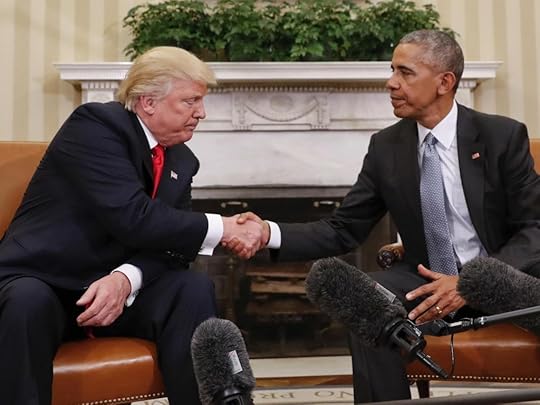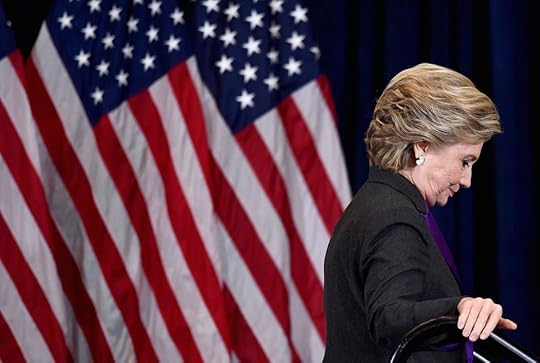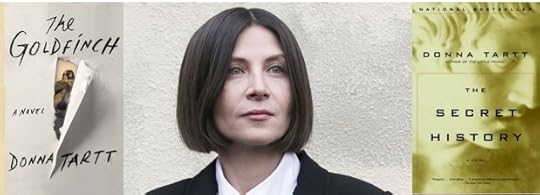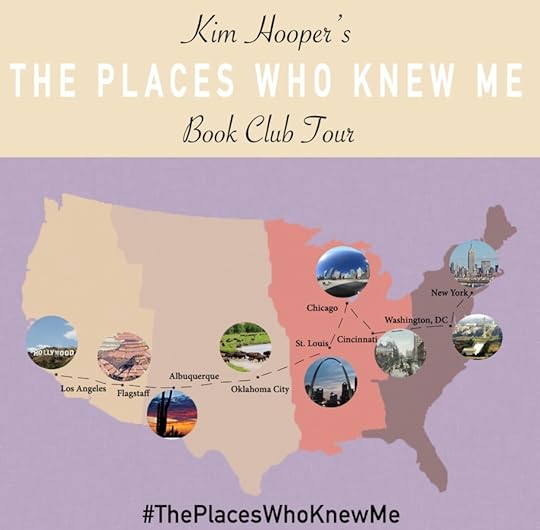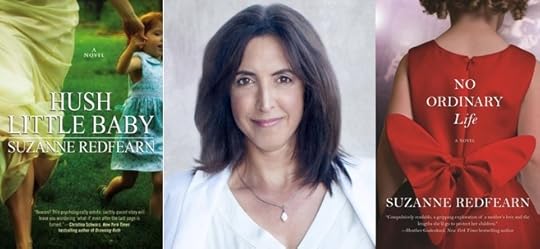Kim Hooper's Blog, page 34
December 20, 2016
Why stories matter: Practicing empathy with fiction
I worry that people think dust has settled after the election. It shouldn’t settle. There is so much that is (and should be) very unsettled. Regardless of your political opinions, the election was a 9.0 on the Richter Scale. It shook us. We realized we are not as united as we thought. People we assumed were on “our side” are staring at us from across the divide with confused looks on their faces.
Since November 8, I’ve noticed a shift in myself. I’ve been trying hard to silence my ego and really hear what others think and feel. Even if I don’t agree, I’m aware I need to understand the other side. I’m trying to think before I speak. I’m trying to check myself. As I said after the election, I don’t know everything.
Just the other day, I was doing an author interview, answering questions about how I feel toward the main character (Emily) in PEOPLE WHO KNEW ME. There is some controversy about Emily and her decision to fake her death on 9/11 and flee to California. The controversy has taken me by surprise. When I wrote the character, I wasn’t caught up in the “right” or “wrong” of her actions as much as I was caught up in trying to portray human complexity. I don’t necessarily agree with all of her choices, but that doesn’t bother me. She makes decisions based on her upbringing, her current circumstances, her youth, her shock in the face of 9/11. She has her reasons.
Lisa Cron writes about this in her essay for Writer Unboxed:
“…Your job as a novelist – first and foremost — is to understand why your characters believe they are right, especially when they’re not. They always have a reason – and that reason isn’t because they’re a jerk, or stupid, or simply mean. That reason is something their life taught them, and to them it feels real and good and true. But – and this is the key thing — it doesn’t mean it is true.”
All this got me thinking about the value of stories. Stories help us understand gray areas of people. Stories encourage compassion where we usually have judgment. Stories allow us to put ourselves in others’ (fictional) shoes, imagine how others feel, see the world through others’ eyes. Stories offer a safe space for reflection. If a character unnerves me, it’s usually because of something in my own life. There’s an opportunity for insight with every emotion a story evokes.
As Cron says:
“Stories press the pause button, allowing us to slip out of our own lives to experience the protagonist’s inner struggle. Stories thus tacitly change our perception of what’s right and wrong. What is sacred and what is profane. What is fair and what is not.”
After the election, I started questioning myself as a writer. Should I be putting my energy toward other things instead of fiction? Obviously, there is so much work out there to be done. Does fiction really matter?
But, it does matter. Fiction helps with empathy, which is what we all need more than anything right now. By cultivating empathy for characters, we, as Cron says, “give dignity and weight to their feelings, even if [we] disagree with the conclusion they’ve drawn.” Characters aren’t real people, but I wouldn’t call them fake people. They’re practice people. We can take what we learn from our interactions with them straight into the real world.
I think it’s important to read a variety of books (participating in Book Riot’s Read Harder Challenge is a good way to do this). It’s important to disagree with characters. It’s important to ask ourselves why we disagree. It’s important to open a dialogue about those disagreements. It’s important to keep an open mind and look beyond the “what” to the “why.”
In her essay, Cron mentions this Proust quote, which is one of my favorites:
There are so many books that have helped me see new universes. Off the top of my head, here are some favorites: The Light Between Oceans (ML Stedman), Middlesex (Jeffrey Eugenides), Love in the Time of Cholera (Garbriel Garcia Marquez), The Lonely Polygamist (Brady Udall), Song of Solomon (Toni Morrison), Catch 22 (Joseph Heller), Slaughterhouse 5 (Kurt Vonnegut), The Bell Jar (Sylvia Plath), The Absolutely True Diary of a Part-time Indian (Sherman Alexie), The Great Gatsby (F. Scott Fitzgerald), I Know Why the Caged Bird Sings (Maya Angelous), Angela’s Ashes (Frank McCourt), The Awakening (Kate Chopin), Dept. of Speculation (Jenny Offill), Euphoria (Lily King), The Goldfinch (Donna Tartt), The Secret History (Donna Tartt), The History of Love (Nicole Krauss), The Invisible Man (Ralph Ellison), The Namesake (Jhumpa Lahiri), Little Children (Tom Perrotta), What is the What (Dave Eggers).
But even the not-so-outstanding books I’ve read have shown me new ways of thinking. That’s the beauty of reading. . . and the necessity for writing.
What are your thoughts? What is the larger-scale purpose of fiction, or art in general?
The post Why stories matter: Practicing empathy with fiction appeared first on Fiction Writing Blog.
November 28, 2016
Famous authors on why they write
Every now and then, I ask myself why I write. I mean, it’s such a strange thing–creating these all-consuming alternate realities and fretting about them for months on end. It calms me to see how other writers describe their need to write. I’ve collected some favorite quotes here:
“I write entirely to find out what I’m thinking, what I’m looking at, what I see and what it means. What I want and what I fear.”
—Joan Didion
“Writing is my way of expressing – and thereby eliminating – all the various ways we can be wrong-headed.”
—Zadie Smith
“I write to find out how much I know… The act of writing for me is a concentrated form of thought. If I don’t enter that particular level of concentration, the chances are that certain ideas never reach any level of fruition.”
—Don DeLillo
“The best thing about writing fiction is that moment where the story catches fire and comes to life on the page, and suddenly it all makes sense and you know what it’s about and why you’re doing it and what these people are saying and doing, and you get to feel like both the creator and the audience. Everything is suddenly both obvious and surprising… and it’s magic and wonderful and strange.”
—Neil Gaiman
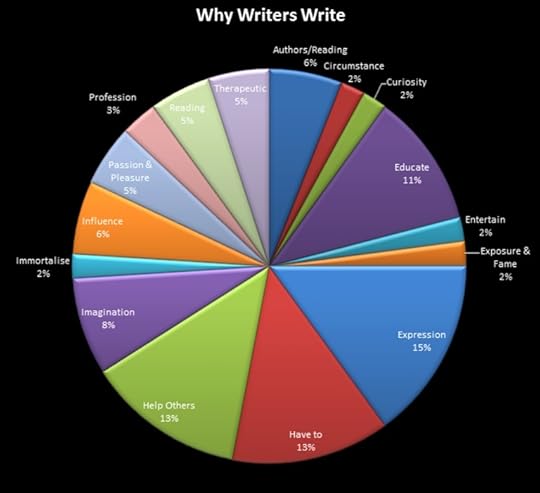 They asked 100 published authors why they write. Click the photo for details. I’m in the “have to” category.
They asked 100 published authors why they write. Click the photo for details. I’m in the “have to” category.“If I don’t write to empty my mind, I go mad.”
—Lord Byron
“Writing is the only thing that, when I do it, I don’t feel I should be doing something else.”
—Gloria Steinem
“Who wants to become a writer? And why? Because it’s the answer to everything. … It’s the streaming reason for living. To note, to pin down, to build up, to create, to be astonished at nothing, to cherish the oddities, to let nothing go down the drain, to make something, to make a great flower out of life, even if it’s a cactus.”
—Enid Bagnold
“I think all writing is a disease. You can’t stop it.”
—William Carlos Williams
“Writing is its own reward.”
—Henry Miller
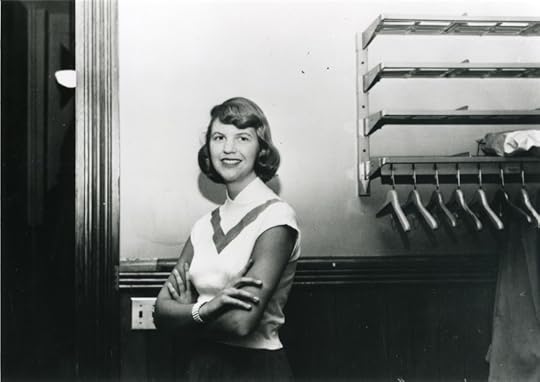
“I want to write because I have the urge to excel in one medium of translation and expression of life. I can’t be satisfied with the colossal job of merely living.”
—Sylvia Plath
“Why does one begin to write? Because she feels misunderstood, I guess. Because it never comes out clearly enough when she tries to speak. Because she wants to rephrase the world, to take it in and give it back again differently, so that everything is used and nothing is lost. Because it’s something to do to pass the time until she is old enough to experience the things she writes about.”
—Nicole Krauss
“I write because I don’t know what I think until I read what I say.”
—Flannery O’Connor
“Any writer worth his salt writes to please himself…It’s a self-exploratory operation that is endless. An exorcism of not necessarily his demon, but of his divine discontent.”
—Harper Lee
“That’s why I write, because life never works except in retrospect. You can’t control life, at least you can control your version.”
—Chuck Palahniuk
Why do I write? The easy answer is, “Because I have to.” For me, it’s like sleeping or eating, a part of basic existence. But why does it have that importance? I think it’s because writing is my way to get to the center of the Tootsie Pop, so to speak. It’s my way of understanding myself and others. By containing stories on pages, I feel a tiny bit of control over the chaos of life. It’s like compartmentalizing at its finest.
Why do you write? Or, if you’re a reader, why do you read?
The post Famous authors on why they write appeared first on Fiction Writing Blog.
November 23, 2016
In defense of unlikable characters
Generally speaking, the reviews for People Who Knew Me have been good. I try not to make a habit of reading them, but I get the general gist when I visit Amazon or Goodreads. If people don’t like the book, it’s usually because they don’t like the main character, Emily (who fakes her death on 9/11 and starts a new life as Connie in California). When I first encountered this criticism, I was perplexed. I’ve always loved flawed characters who make questionable choices. Thankfully, Roxane Gay spoke my mind on this subject in her essay, “Not Here to Make Friends: On the importance of unlikable female protagonists” in Bad Feminist.
Some excerpts I love:
“In many ways, likability is a very elaborate lie, a performance, a code of conduct dictating the proper way to be. Characters who don’t follow this code become unlikable. Critics who fault a character’s unlikability cannot necessarily be faulted. They are merely expressing a wider cultural malaise with all things unpleasant, all things that dare to breach the norm of social acceptability.”
“As a writer and a person who has struggled with likability — being likable, wanting to be liked, wanting to belong — I have spent a great deal of time thinking about likability in the stories I read and those I write. I am often drawn to unlikable characters, to those who behave in socially unacceptable ways and say whatever is on their mind and do what they want with varying levels of regard for the consequences. I want characters to do bad things and get away with their misdeeds. I want characters to think ugly thoughts and make ugly decisions. I want characters to make mistakes and put themselves first without apologizing for it… I want characters to do the things I am afraid to do for fear of making myself more unlikable than I may already be. I want characters to be the most honest of all things — human.”
“That the question of likability even exists in literary conversations is odd. It implies we are engaging in a courtship. When characters are unlikable, they don’t meet our mutable, varying standards. Certainly, we can find kinship in fiction, but literary merit shouldn’t be dictated by whether or not we want to be friends or lovers with those about whom we read.”
“Writers are often told a character isn’t likable as literary criticism, as if a character’s likability is directly proportional to the quality of a novel’s writing. This is particularly true for women in fiction. In literature as in life, the rules are all too often different for girls. There are many instances where an unlikable man is billed as an anti-hero, earning a special term to explain those ways in which he deviates from the norm, the traditionally likable. Beginning with Holden Caulfield in Catcher in the Rye, the list is long. An unlikable man is inscrutably interesting, dark, or tormented but ultimately compelling even when he might behave in distasteful ways. This is the only explanation I can come up with for the popularity of, say, the novels of Philip Roth who is one hell of a writer, but also a writer who practically revels in the unlikability of his men, their neuroses and self-loathing (and, of course humanity) boldly on display from one page to the next.
When women are unlikable, it becomes a point of obsession in critical conversations by professional and amateur critics alike. Why are these women daring to flaunt convention? Why aren’t they making themselves likable (and therefore acceptable) to polite society? In a Publisher’s Weekly interview with Claire Messud about her recent novel The Woman Upstairs, which features a rather “unlikable” protagonist named Nora who is bitter, bereft, and downright angry about what her life has become, the interviewer said, “I wouldn’t want to be friends with Nora, would you? Her outlook is almost unbearably grim.” And there we have it. A reader was here to make friends with the characters in a book and she didn’t like what she found.
Messud, for her part, had a sharp response for her interviewer. “For heaven’s sake, what kind of question is that? Would you want to be friends with Humbert Humbert? Would you want to be friends with Mickey Sabbath? Saleem Sinai? Hamlet? Krapp? Oedipus? Oscar Wao? Antigone? Raskolnikov? Any of the characters in The Corrections? Any of the characters in Infinite Jest? Any of the characters in anything Pynchon has ever written? Or Martin Amis? Or Orhan Pamuk? Or Alice Munro, for that matter? If you’re reading to find friends, you’re in deep trouble. We read to find life, in all its possibilities. The relevant question isn’t ‘Is this a potential friend for me?’ but ‘Is this character alive?’”
Perhaps, then, unlikable characters, the ones who are the most human, are also the ones who are the most alive. Perhaps this intimacy makes us uncomfortable because we don’t dare be so alive.”
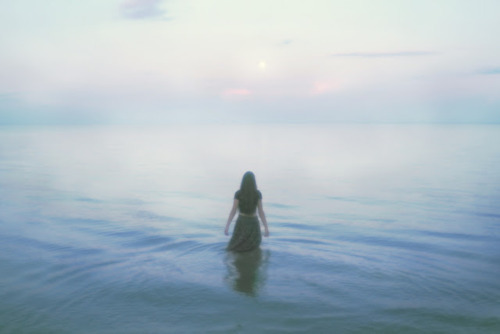 Image inspired by one of my favorite controversial female characters, Edna Pontellier in The Awakening.
Image inspired by one of my favorite controversial female characters, Edna Pontellier in The Awakening.When people said they hated my main character, or thought she was “the most selfish person on the planet,” I felt defensive, not because she is my character, but because I didn’t agree with this notion of needing to condone everything a female main character says or does. Like Roxane Gay says, there are plenty of acclaimed-yet-flawed male characters. My example is always Dr. Hannibal Lecter. How is my character “the most selfish person on the planet” compared to a cannibalistic serial killer?
I don’t necessarily agree with many of the fictional characters I love. I don’t even agree with my own characters. That’s the joy of fiction for me–seeing life from another’s perspective, trying to imagine the mindsets that lead to certain choices. I don’t read books to make friends; I read to explore human nature. I am often bored by characters (and people, in general) who don’t have a single ugly thought. The other night, a friend expressed a dark secret to me and I said, “Thank god, you’re human.”
So, I guess I can say that if a character is too “likable,” I can’t get into the story. It doesn’t interest me. Every day, I’m bombarded with subtle messages about how women are supposed to act; when I read, I want characters to give the finger to those expectations.
What are your thoughts on this? Does a character’s “likability” affect how you enjoy a book? Why or why not?
The post In defense of unlikable characters appeared first on Fiction Writing Blog.
On unlikable characters
Generally speaking, the reviews for People Who Knew Me have been good. I try not to make a habit of reading them, but I get the general gist when I visit Amazon or Goodreads. If people don’t like the book, it’s usually because they don’t like the main character, Emily (who fakes her death on 9/11 and starts a new life as Connie in California). When I first encountered this criticism, I was perplexed. I’ve always loved flawed characters who make questionable choices. Thankfully, Roxane Gay spoke my mind on this subject in her essay, “Not Here to Make Friends: On the importance of unlikable female protagonists” in Bad Feminist.
Some excerpts I love:
“In many ways, likability is a very elaborate lie, a performance, a code of conduct dictating the proper way to be. Characters who don’t follow this code become unlikable. Critics who fault a character’s unlikability cannot necessarily be faulted. They are merely expressing a wider cultural malaise with all things unpleasant, all things that dare to breach the norm of social acceptability.”
“As a writer and a person who has struggled with likability — being likable, wanting to be liked, wanting to belong — I have spent a great deal of time thinking about likability in the stories I read and those I write. I am often drawn to unlikable characters, to those who behave in socially unacceptable ways and say whatever is on their mind and do what they want with varying levels of regard for the consequences. I want characters to do bad things and get away with their misdeeds. I want characters to think ugly thoughts and make ugly decisions. I want characters to make mistakes and put themselves first without apologizing for it… I want characters to do the things I am afraid to do for fear of making myself more unlikable than I may already be. I want characters to be the most honest of all things — human.”
“That the question of likability even exists in literary conversations is odd. It implies we are engaging in a courtship. When characters are unlikable, they don’t meet our mutable, varying standards. Certainly, we can find kinship in fiction, but literary merit shouldn’t be dictated by whether or not we want to be friends or lovers with those about whom we read.”
“Writers are often told a character isn’t likable as literary criticism, as if a character’s likability is directly proportional to the quality of a novel’s writing. This is particularly true for women in fiction. In literature as in life, the rules are all too often different for girls. There are many instances where an unlikable man is billed as an anti-hero, earning a special term to explain those ways in which he deviates from the norm, the traditionally likable. Beginning with Holden Caulfield in Catcher in the Rye, the list is long. An unlikable man is inscrutably interesting, dark, or tormented but ultimately compelling even when he might behave in distasteful ways. This is the only explanation I can come up with for the popularity of, say, the novels of Philip Roth who is one hell of a writer, but also a writer who practically revels in the unlikability of his men, their neuroses and self-loathing (and, of course humanity) boldly on display from one page to the next.
When women are unlikable, it becomes a point of obsession in critical conversations by professional and amateur critics alike. Why are these women daring to flaunt convention? Why aren’t they making themselves likable (and therefore acceptable) to polite society? In a Publisher’s Weekly interview with Claire Messud about her recent novel The Woman Upstairs, which features a rather “unlikable” protagonist named Nora who is bitter, bereft, and downright angry about what her life has become, the interviewer said, “I wouldn’t want to be friends with Nora, would you? Her outlook is almost unbearably grim.” And there we have it. A reader was here to make friends with the characters in a book and she didn’t like what she found.
Messud, for her part, had a sharp response for her interviewer. “For heaven’s sake, what kind of question is that? Would you want to be friends with Humbert Humbert? Would you want to be friends with Mickey Sabbath? Saleem Sinai? Hamlet? Krapp? Oedipus? Oscar Wao? Antigone? Raskolnikov? Any of the characters in The Corrections? Any of the characters in Infinite Jest? Any of the characters in anything Pynchon has ever written? Or Martin Amis? Or Orhan Pamuk? Or Alice Munro, for that matter? If you’re reading to find friends, you’re in deep trouble. We read to find life, in all its possibilities. The relevant question isn’t ‘Is this a potential friend for me?’ but ‘Is this character alive?’”
Perhaps, then, unlikable characters, the ones who are the most human, are also the ones who are the most alive. Perhaps this intimacy makes us uncomfortable because we don’t dare be so alive.”
 Image inspired by one of my favorite controversial female characters, Edna Pontellier in The Awakening.
Image inspired by one of my favorite controversial female characters, Edna Pontellier in The Awakening.When people said they hated my main character, or thought she was “the most selfish person on the planet,” I felt defensive, not because she is my character, but because I didn’t agree with this notion of needing to condone everything a female main character says or does. Like Roxane Gay says, there are plenty of acclaimed-yet-flawed male characters. My example is always Dr. Hannibal Lecter. How is my character “the most selfish person on the planet” compared to a cannibalistic serial killer?
I don’t necessarily agree with many of the fictional characters I love. I don’t even agree with my own characters. That’s the joy of fiction for me–seeing life from another’s perspective, trying to imagine the mindsets that lead to certain choices. I don’t read books to make friends; I read to explore human nature. I am often bored by characters (and people, in general) who don’t have a single ugly thought. The other night, a friend expressed a dark secret to me and I said, “Thank god, you’re human.”
So, I guess I can say that if a character is too “likable,” I can’t get into the story. It doesn’t interest me. Every day, I’m bombarded with subtle messages about how women are supposed to act; when I read, I want characters to give the finger to those expectations.
What are your thoughts on this? Does a character’s “likability” affect how you enjoy a book? Why or why not?
The post On unlikable characters appeared first on Fiction Writing Blog.
November 13, 2016
The 5 stages of grieving Donald Trump
This is a blog about fiction writing. I know. And I’m sorry if you’re here to read about fiction. For the first time since I started this blog six years ago, I feel compelled to talk about real life.
I am grieving. There’s no other way to describe it. On the evening of the election, as it became clear that the unthinkable was going to happen, I cried. I took two sleeping pills to get through the night. The next day, I woke up feeling like I’d run a marathon hours before. I was in a daze. “It feels like the morning after 9/11,” I told my husband. There was that fear and uncertainty and shock, that loss of faith in humanity. I was out the door, heading to work, when I realized I was wearing two different shoes.
I keep cycling through the stages of grief–well, all of them except for acceptance. I’m not at acceptance yet. Maybe I’ll be closer by the end of this post.
Denial
There are moments I forget that Donald Trump will be the President. I go through the motions of my daily life. I write ad copy. I work on ideas for my novels. I walk the dogs. But, then, it hits me. The water is boiling for pasta and I say, out of nowhere, “I just can’t believe this.” It’s worst in the morning. It takes a few seconds, upon waking up, to realize this isn’t a dream. This is reality.
But the country couldn’t have voted for a reality TV star with a shady business past and absolutely no government experience, right? The country couldn’t have elected a man who bragged about grabbing women by the pussy, right? The country couldn’t have overlooked how he made fun of a disabled reporter, right? The country couldn’t have forgotten that his wife blatantly plagiarized Michelle Obama, right? The country must have seen the absurdity of his Twitter rants, the ridiculousness of his claim that he has “a winning temperament,” right? The country couldn’t possibly think that endorsements from Putin and the KKK are a good thing, right?
Wrong. That one word shatters the denial. All these assumptions I’ve made are dead wrong. We can say #NotMyPresident, but he is our President. What’s done is done. The question is: What now?
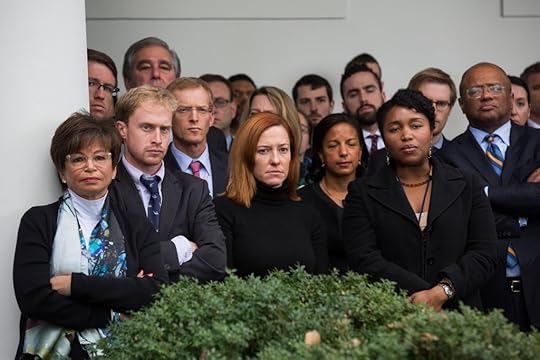 White House Staff listening to Obama announce Trump’s victory.
White House Staff listening to Obama announce Trump’s victory.Anger
Anger is, by far, my favorite stage of grief. It feels active. It motivates me, lights the proverbial fire under my ass.
At first, I was angry at the Trump supporters. I was angry at them for not seeing what they’d done. I was angry at them for believing the lies and the sound bites. I was angry at them for cherry-picking one or two Trump issues and voting for him based on those, while turning a blind eye to the rest of the shit show that Trump is. “Nobody is taking my guns.” “We have to protect our borders.” “We need to keep jobs in the U.S.” “Hillary is crooked.” “We need to shake up Washington.” They clung to these things, fiercely.
What’s ironic is that Hillary wasn’t going to take all of your damn guns. And she was going to protect your borders (just not by rounding up 2 million immigrants and taking them back to Mexico, then building a ludicrous wall funded, somehow, by the aforementioned country). She was all for keeping jobs here (by the way, many of Trump’s construction projects used materials from China, so that’s a nice f**k you to the rust belt; and he’s also known to hire foreign workers. While I’m at it, can we take a moment to appreciate that they’re saying Melania Trump was an illegal immigrant?). I’m not convinced that Hillary is “crooked”; I am convinced that Trump is crooked. Have we forgotten that he is set to go on trial for fraud?
I was angry at his supporters who dismissed every one of his grievances, saying, “Oh, he’s just riling people up. He doesn’t mean everything he says.” Yes, he does. He’s not just riling people up. That’s who he is. On what’s probably his best behavior, mind you. Maya Angelou said it best: “When someone shows you who they are, believe them; the first time.”
I was angry at his supporters who said, “He’s not actually going to grab women by the pussy as President” or “They’ll never actually drive around buses, Nazi-style, to round up immigrants.” In my mind, his future behavior and the legislation that gets passed remain unknown. What’s known–and what the real point is–is that ideologies of hate have already spread. The damage has already been done. Even if Trump isn’t a racist, xenophobic, misogynistic asshole in his heart of hearts, he has followed a script in his campaign that incited people who are. There are a bunch of nut jobs who feel validated by Trump’s victory, empowered to yell at Muslims to “go back to where they came from,” entitled to harass women and gays. People used to come to America to escape oppression; now we are a country of oppression. That’s the real tragedy here. How can Trump supporters not see this?
But, then, I got angry at Trump. I’ve said all along that I think he ran for President to garner publicity. Then he realized people were actually supporting him and his power-hungry narcissism took on a life of its own. It’s so out of control now that even if he has a passing moment of doubt as he starts to get briefings about Syria and other things he knows nothing about, he won’t say anything. He won’t admit ignorance. He won’t ask for help. Which is, in a word, terrifying.
Kudos to his campaign team for tapping into the undercurrent of racism and sexism in this country. They had their finger on the pulse of dissatisfaction–dissatisfaction with Obama (which must be largely racist considering he has made our country objectively better by most people’s standards), dissatisfaction with “outsiders,” and dissatisfaction with the very idea of a woman leading the country. Trump kept his finger–the middle one, I imagine–right on that pulse, taking it off only to stick it up at the blind crowds listening to him.
Let me be clear–not all Trump supporters are stupid idiots. It does a disservice to democracy to imply they are. They’re not even all white rednecks, as some assume. They are people tired of “politics.” They are people who were looking for someone to “shake things up.” Trump exploited their concerns for his own gain. He scammed them, just like he scammed others in his business dealings. He said himself, “I could stand in the middle of 5th Avenue and shoot somebody and I wouldn’t lose voters.” He was so impressed with his own scamming that he couldn’t resist bragging about it. And his followers didn’t realize he was making fun of them. By wearing his “Make America Great Again” ball cap with camouflage print, he convinced his base that he was one of them, that he was on their side. The truth: he has no history of giving a shit about them. This is the man who considered the millions his dad gave him “a small loan.” He lives in a Penthouse in New York. He has a history of giving a shit only about himself.
Bargaining
“Can we get a re-do? I promise I’ll get out there and campaign more. I’ll speak up. I’ll be an activist.” I have so many personal regrets. I stayed quiet during the campaigns because I don’t like to offend people. I prefer to play nice. Let bygones be bygones and all that jazz. And, honestly, I thought Hillary would win. I thought Trump supporters were like cute novelty items. I did not take them–or him–seriously. Big mistake.
Now, I see no choice but to be open and honest about my beliefs. Now, I think we all have to initiate more conversations. There’s an obvious divide, and nothing will change if we just stay complacent and silent on our separate sides of the chasm. I’ll do better from here on out. I promise.
Depression
I’m sad, more than anything else. I’m sad for the end of an era. The role of American President has a long-standing history of being the most prestigious role in the world. Now, that’s ruined. I don’t think I’m being overly dramatic. It’s ruined. Trump made a mockery of the system by running, and now that he’s won, I imagine the founding fathers are rolling over in their graves. People say, “Oh, it’s just like when we elected Reagan. He was an actor!” No, guys, it’s not the same. Reagan was politically active. He was Governor of California for 8 years. He had, you know, qualifications. I understand people wanting to “change things up,” but voting for someone who has no qualifications is just…weird. Would you want someone to operate on you if they hadn’t been to medical school? I don’t think so.
Obama must be beside himself. Everything he’s worked at for 8 years–protecting the environment, advancing women’s rights, improving foreign relations, extending healthcare to more people–is at risk of being undone (Trump says he plans to “cancel every unconstitutional executive action, memorandum and order issued by President Obama”). I’m in awe of the graciousness Obama displayed as he handed over the keys to the White House to a complete bigot who repeatedly called into question where Obama was born. I, myself, had tears in my eyes.
I can’t even imagine how Hillary feels. I can’t imagine her disillusionment. Her loss is a loss for many of us women. We wanted her to prove that it’s not just a man’s world. I felt for her during the campaign. She couldn’t attack Trump because they’d call her a bitch. She couldn’t show emotion because they’d call her weak. So, she was rehearsed and sometimes robotic. And it bit her in the ass. The fact that lots of women voted for Trump confused me at first, but now I wonder if this reveals another sad reality: Some women don’t like other women in power. Women are catty and competitive and judgmental. Our solidarity needs work.
But what’s saddest of all is that Hillary spent decades as a public servant to become arguably the most qualified candidate we’ve ever had. And she lost. Well, actually, they’re saying she won the popular vote by 2 million votes. The electoral college makes no sense, but that’s a topic for another post. What is ironic is that Trump lambasted the electoral college (on Twitter, of course) when Obama won in 2012. Now he’s taking to Twitter to complain about the protesters in the streets, saying they are “very unfair.”
No, Donald, what’s unfair is everything we, as a country, may suffer with you as our President. Judging by your promises and the idiots you are choosing for your administration (Sarah Palin? Really? Is this because she can see Russia from her house?), the following atrocities are likely: Women will lose reproductive rights, millions will lose access to health care, minorities will be subjected to hate crimes, the environment will be subjected to hate crimes, global warming will escalate (he wants to appoint a climate change naysayer to head the EPA), gays will have to fight against beliefs resurrected from 1950 (Mike Pence thinks they should undergo conversion therapy), the economy will collapse (for one, I don’t know how Trump plans to replace the 2 million laborers he wants to send back to Mexico; two, independent analysts have said that his tax plan would balloon the national debt), and we may be in World War 3 (considering all the countries we will piss off by leaving NATO and NAFTA and becoming BFFs with Putin. Let’s also not forget that we are giving the nuclear codes to someone who can’t control his temper on social media).
Acceptance
I can’t accept Trump as my President. His supporters tell us to stop fighting it and I say to them, “Like you stopped fighting Obama for 8 years?”
What I can accept is that I need to “go high” (Hillary’s words) and be the bigger person. What I can accept is that being angry at Trump supporters is wrong. They are Americans just like me. What I can accept is that I’ve been in a bubble in California, where weed is now legal and electric cars are everywhere and lots of people speak Spanish (I was fluent for years) and the company I work for helps people pay for gender reassignment surgery. What I can accept is that I don’t know everything.
I refuse to buy into the hateful rhetoric that Trump promoted in his campaign. If I hate a Trump supporter, I am no better than a Trump supporter hating Hillary or Obama or Muslims or Mexicans or gays or women. I won’t do it.
And I won’t move to Canada. My husband and I looked into it. We were one of the many people who caused the Canadian immigration website to crash on election night. I was so embarrassed and ashamed of those “red states.” But, now, I realize that a big percentage of the population in those states voted for Hillary. Just because a slightly bigger percentage voted for Trump doesn’t mean those states are lesser in my mind. It just means there is a lot of work to do.
So, I’m staying. I want to volunteer for causes I believe in. I want to make my voice heard. I want to exercise my First Amendment rights. I want to assure those founding fathers that they can roll on back over and rest easy for all eternity because there are so many of us who want to fight the good fight.
The post The 5 stages of grieving Donald Trump appeared first on Fiction Writing Blog.
November 6, 2016
Spotlight on: Donna Tartt
I fell in love with Donna Tartt’s writing when I read The Goldfinch. For some reason, it took me a year or so to get to The Secret History, her first book. The book she wrote between the two, The Little Friend, is next on my list. She writes the kind of books I dream of writing–epic stories with amazing detail and stunning character development. Frankly, I don’t know if I have the patience to write the way she does. It doesn’t surprise me that there are years between her books. The care shows in each of her paragraphs. I feel very immature in comparison, rushing to get my thoughts out there before they are ready. I wanted to know a bit more about her process, so I explored the Internet for some gems of insight.
On writing long books:
“I never want it to be really long! I always think, “I want this to be really short,” but it never happens that way.” (Source)
“I enjoy the process of writing a big long novel. Melville came up with the best metaphor for it: a deep-sea dive. “I love all men who dive,” he says. “Any fish can swim near the surface, but it takes a great whale to go down stairs five miles or more; & if he don’t attain the bottom, why, all the lead in Galena can’t fashion the plummet that will.” He’s talking here not about Moby Dick, as you might think, but about writers—about “thought-divers,” as he calls them, “the whole corps that have been diving & coming up again with bloodshot eyes since the world began.
Anyway, it gets into one’s blood, this long lonely way of writing, like a long sea-voyage. Men used to come back from three-year whaling voyages sunburnt and emaciated and vowing never to go on another one, yet something would draw them back to the water again. And it’s the same with me. I’ve written only two novels, but they’re both long ones, and they each took a decade to write. It’s a slow, quiet, gorgeous drift, with its own pleasures and difficulties and dangers, completely removed from whatever storms are going on up on the surface, and there’s a slight sense of decompression when I come back up and into the regular old noisy world again. So I’m rather anxious to get back to work on something else. Not preliminary dives—not the little shallow ones, where you’re only getting ready—but the kind where you don’t come up again for years.” (Source)
On the time between books:
“There’s an expectation these days that novels—like any other consumer product—should be made on a production line, with one dropping from the conveyor belt every couple of years. But it’s for every writer to decide his own pace, and the pace varies with the writer and the work.” (Source)
“When I was young, I was deeply struck by a piece of advice that John Gardner gave to beginning writers: “Write as if you have all eternity,” he says. This is the last thing a publisher or an agent or an accountant would tell you, but it’s the best advice in the world if you want to write beautiful, well-made books. And that’s what I want to do. I’d rather write one good book than ten mediocre ones.” (Source)
On themes in her work:
“Almost never, in writing a novel, do I find myself thinking about themes or symbols or things of that nature. They either occur naturally within a story—which is to say, spontaneously and unconsciously, as they do in a dream—or else they seem a bit forced.” (Source)
On the mess of starting a new novel:
“You don’t know what you’re doing for a long time. It seems like a huge mess because it is a huge mess. If you looked at the notes from early on in the writing of this book, you’d think, “This person is crazy. This could never be a novel.” That’s how all my books have felt when I started writing them. Trying to explain them to people was like trying to explain a dream.” (Source)
On where she writes:
“I write by hand, in notebooks, so my work is very portable. I have an office, which is tiny and crowded–I seem to work better in small rooms–but I’m also happy working in a hotel room or a carrel in the library. And sometimes if I’m feeling particularly beleaguered or fretful I’ll write in bed. Great storms of paper everywhere.
The one place I don’t like to work is outdoors. And, even on beautiful days, I keep the windows shut, as I live in terror of the gust of wind that will send my papers flying all over the room.” (Source)
On the tools of her writing process:
“For actual composition: I write by hand, with ball point pen, in college-ruled spiral notebooks, the kind that children use for school. In the fall when the school supplies are in the store, I’ll tend to buy lots of them so I can get just the kind I want: silly patterns and colors are, for me, an important aide memoire, a mental filing system. When I was finishing Goldfinch, I had a series of notebooks that had covers from Beatles albums, and when I was looking for something, it was easier for me to think: “Oh, I wrote that in the ‘Hard Day’s Night’ notebook” or “I wrote that in the ‘Sgt. Pepper’ notebook” rather than “I wrote that in the blue notebook.”
Anyway, that’s how I write: by hand, in notebooks. By the end of this book, I had stacks of them. And then, I’ll often go and write over that draft in colored pencil (colored, so that the revisions stand out.) When the notebook starts getting too tangled-up to read, I’ll type it up into a computer–I print out my drafts on different colors of paper, because with a long book, the paper tends to pile up, and it’s easier to keep different versions straight that way. You’re reaching for the pink draft, or the blue draft, or the gray draft, instead of being lost amidst stacks of white paper and not knowing what’s what.”(Source)
On what she eats and drinks when writing:
“Coffee makes me too anxious and vigilant—I get most of my best work done when I’m in a more relaxed state of mind. So I drink tea when I’m writing. But I don’t drink a lot of it: a cup of Assam or strong Scottish Breakfast when I go to my desk in the morning and then, mid-afternoon, if I’m still at my desk, a cup of something perfume-y to cheer me up, like rose or jasmine. As for food: if my work’s not going well I’ll keep drifting into the kitchen and prowling for something to eat, but when I’m really working hard all I want are little things to nibble on–an apple, a handful of almonds, a peach. If someone brings me something I’ll eat it happily, but I’m generally too distracted to go hunt it down myself. And then at some point I look up and realize: I’m starving!” (Source)
On her reading habits:
“I read a lot while I’m writing. If I’m feeling dull or uninspired, I’ll often reach for a book of poetry: often an anthology of British and American poets of the 20th century that I’ve had since high school and am superstitious about. At night, I like to read something completely different from what I’m working on, to get my mind off my work–Ivy Compton-Burnet is always bracing and fresh, and so is P.G. Wodehouse.” (Source)
On how she keeps writing:
“Sleep is always helpful for me. If I can manage to take a nap in the afternoon, just the right kind of nap, I’m often good for another three or four hours of work before dinner. A walk about three in the afternoon is also helpful.”
On being antisocial:
“I try to avoid social engagements. It’s hard for me to socialize or see people while I’m working. I sleep irregular hours and eat irregular hours and don’t like to be interrupted to go have dinner with someone if my writing is going well. Sometimes even knowing that I have a dinner engagement in the evening will keep me from working well during the day. I DO have a number of exuberant email correspondents though–writing letters to people at the end of the day is often my way of winding down from a day of work.” (Source)
On her favorite childhood book:
“The first book I really fell hard for was “Peter Pan.” There’s something of “Peter Pan” in every single thing I’ve written. It’s there in everything, very, very deeply. I also loved “The Wind in the Willows.” My mother read that aloud to me. “Peter Pan” was the first book I loved that I read to myself. It was a drug, an altered state of consciousness. You weren’t at your school. You were really somewhere else.”(Source)
On the distractions of technology:
“Since finishing the book I’ve been thrown into having to check my cellphone more than five times a day. I used to check it once a week. I’d leave it up in a corner of the house, because that’s the only place where there’s cellphone reception. Now it’s very different. Obviously I can’t do that right now or people from Little, Brown would come and break down my door.” (Source)
On writing male main characters:
“I had a fairly well-known editor tell me that “The Secret History” would never be published because no successful book by a woman had ever been written from the point of view of a man, and that I would have to change it to a female narrator. But that novel would never have worked with a female narrator because then you would inevitably have the question of whether she was attracted to some of the male characters … it would just never work. It would have been a different book. It could only work if no question of attraction came into it.” (Source)
On the kinds of books she strives to write:
“The kind of book that you can absolutely lose yourself in; where you’re in a different world, your mother calls you, you don’t hear her – that kind of book.” (Source)
Fun facts:
Tartt was born in Mississippi
At Bennington College in the early 1990s, she befriended Bret Easton Ellis, Jill Eisenstadt, and Jonathan Lethem. She dated Ellis for a while and they shared their respective works in progress ( Less Than Zero and The Secret History )
She is a Roman Catholic
On the wall of her office is a quote from Paul Valéry: “Disorder is the condition of the mind’s fertility”
She is so well-read that she is known to recite entire poems and passages from French novels
The post Spotlight on: Donna Tartt appeared first on Fiction Writing Blog.
October 29, 2016
Book clubs, I’m coming for you
I’m embarking on a virtual book club tour, talking with readers in cities where my characters stopped on their road trip from California to New York. No matter what city you’re in, contact me if you’re interested in an author appearance (via phone, Skype, or in person) at your club meeting. If you’re looking for questions to fuel your discussion of the book, I have some here. (Note: the questions contain spoilers!)
The post Book clubs, I’m coming for you appeared first on Fiction Writing Blog.
October 24, 2016
A chat with Suzanne Redfearn
One word I really hate: Networking. It gives me chills in that nails-on-a-chalkboard kind of way. When you’re trying to make it as a writer, people will tell you to “network.” For years, I resisted this, and then I realized that I didn’t have to “network”; I could just talk with fellow writers, like group therapy. I like this much better.
I met Suzanne Redfearn through Anita Hughes. I am really fortunate that there is a community of wonderful writers in my own backyard. Suzanne and I have similar writing styles and similar writing processes (like her, I’m a “pantser”–I write by the seat of my pants, without an outline). Suzanne has published two books–Hush Little Baby in 2013 and No Ordinary Life this year.
I asked Suzanne a few questions and here’s what she had to say:
I know you used to work in architecture. Have you always wanted to be a writer, or was it an ambition that just hit you?
It was actually a bucket-list endeavor. Architecture had hit a slump, and I had this crazy idea for a story, so I sat down and started to write with the only goal being to finish. Seven months later I had a novel. It was terrible, really awful. I didn’t know how to structure sentences. My grammar was atrocious. It was littered with “he was,” “she was,” “it was” sentences and full of worn-out clichés. But the miracle was that, despite all that, hidden in all that terrible writing was this amazing stories with these incredible characters who had been in my head and were now on the page and taking me on this remarkable journey. I was hooked. I set about learning the craft, and five novels later, finally hit on the right story that made it through the gauntlet of obstacles to getting published.
How have your family and friends adjusted to Suzanne the Writer? (I ask this because I think writers are a unique species, with special needs. At least, that’s what my husband says.)
It’s been great fun. Everyone is so proud, especially my kids. I think they get a real kick walking into a bookstore or Target and seeing my book on the shelf (it’s super cool for me too). I do agree with you that writers are a unique bunch, and I think that has been one of the most fulfilling aspects of this career change, meeting all the great writers that I have and developing this new wonderful circle of friends.
I read your author’s note at the end of Hush Little Baby, where you explained that your husband is nothing like the abusive husband in the novel. What inspired that note?
I love author notes. I always feel a little let down when I finish a really great novel, like I am saying goodbye to a good friend, so to have that little extra insight at the end sort of softens the blow. It gives the reader time to reflect on the story and how it was created. Plus, my husband really is a terrific guy, so I really did not want anyone thinking my story about domestic violence was in any way inspired by him or by my life.
There are some writers who are very transparent with their readers and others who shy away from discussing their personal lives and the inspiration for their writing. I’m thinking of M.L. Stedman and “The Light Between Oceans.” Lots of people have asked her how the story related to her life and she does not discuss it. What are your thoughts? What do you think the relationship between writers and readers should be? Or what do you want it to be?
I think it’s personal. I love talking to readers about my stories. I find it fascinating. Sometimes they see things from such a different perspective and it can create a really dynamic discourse. I think that’s why book clubs are so popular. It is really fun to discover how different minds interpret stories. My stories usually have very little to do with my mostly boring, ho hum life, so transparency isn’t really an issue. Sometimes I think that’s why I love writing so much, it can be such an extraordinary adventure, and I never have to change out of my pajamas.
No Ordinary Life is about the mother of a child who finds Hollywood stardom, and the pros and cons of that from a parent’s perspective. What inspired the book? In general, where do you get your ideas?
As an author with a major publisher, you quickly get branded. And my brand, after Hush Little Baby, became mothers protecting their children. I made the mistake of writing a book outside those parameters and it was rejected. The day I was told no, I was in a grocery store waiting to check out, and in the magazine rack beside me was a tabloid with the headline, “Zac Efron Enters Rehab Again.” My daughter had been a huge fan of High School Musical, so I felt like I had watched Zac Efron grow up. My heart went out to him and his family, especially seeing that his struggle was being publicized for the whole world to see. And the idea came to me. Child Star, the effect fame has on a person and the people around them. The title was later changed to No Ordinary Life.
Some writers outline their stories, some don’t. What camp are you in and why?
I am a born pantser (I write by the seat of my pants). My stories always start as a sort of vague idea, like the one above for No Ordinary Life, then I just start to write. I write any idea that comes to me, and I don’t edit myself, pure stream of consciousness. Chronology doesn’t matter. I know I will figure out how to pull it together later. On the story I just finished, I ended up writing the beginning last. It’s a great way to write. I am constantly surprised by the twists and turns that develop along the way.
What is your typical writing routine? Do you have a set schedule you stick to?
When I am in the thick of it, the creative “vomiting it out” phase, I write every day and obsessively, afraid of losing the mojo and energy of the moment. Then, after it is all out, I settle into a more steady routine of editing for one to two hours, taking a break, editing again for a couple of hours, then calling it a day.
I know you have a new novel in the works. How would you describe the stages of writing a book? Do you prefer to get it all out and then edit, or edit as you go? When do you know it’s ready for your agent or publisher?
It never feels perfect, but I’ve come to realize that’s okay. The story is going to go through so many edits along the way that as long as the plot is compelling and the characters are well developed, I know the writing will be smoothed out and the niggles resolved before it goes to print. I don’t edit when I am “vomiting.” I find it is too detrimental to the ego and to that magical jolt that happens at the start of a project. The writing is always really bad in the first draft because I am just trying to get out of the way and let the story tell itself, so there’s a real danger that, if I read it before I’ve captured it, I will get so discouraged that my enthusiasm will be completely deflated and the story will disappear, the mantra, I suck, I suck, I suck, resounding in my head and making it impossible to continue.
And, now, a few questions I like to ask every writer:
What would be your advice to a new writer looking to get published?
Write. Write, write, write, and then write some more. The more mud you throw on the wall, the more chance you have of writing the right story, the one that will make it through the very difficult gauntlet of agents, editors, and marketing departments to make it to the shelf of Barnes and Noble.
What do you wish you had known before publishing your first book?
I think I wish I would have known how personal the book would be to the readers and how much they would care about the characters. It would not have made a huge impact on the story, but there are certain things I would have altered so readers understood the characters a little more and their motives. Some of the feedback I received after made me realize how misinterpreted some of the actions were simply because I didn’t take the time to explain the reason a character did what they did.
What’s the best part of being a writer? The worst?
Best part is the readers. It is amazing to have a story that was inside your head, go out into the world and impact total strangers who then write to you and tell you how much they enjoyed it or related to it or were changed by it. Awesome. Worst part? There is no worst part. I sit around in my pajamas and tell stories all day.
The post A chat with Suzanne Redfearn appeared first on Fiction Writing Blog.
October 17, 2016
An interview with my husband
When my book was released back in May, I was on a local radio show (full broadcast here) and my husband Chris tagged along for support. At one point in the interview, the host directed a question at Chris: “What’s it like being married to a writer?” Chris was not expecting any questions at all, so he was completely caught off guard. I think he said, “It’s . . . good.” This still makes me laugh.
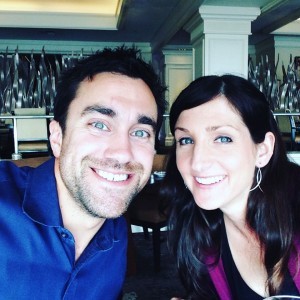 This is us on May 24–our wedding anniversary AND the day of my book launch.
This is us on May 24–our wedding anniversary AND the day of my book launch.I don’t think Chris had any idea what he was getting into when we started dating. I told him I wrote books, but I hadn’t had anything published, so I think he equated my writing to a knitting hobby (which, I guess, it was). Then I got my book deal and he came along with me on the journey to publication. He attends all my events, and he lingers in the back like a creeper and asks questions as if he doesn’t know me: “So, how much research did you have to do for this book?” “Some people love your main character, some hate her–how do you feel about that?” In the words of my sister, “he’s precious.”
I never really thought about what it was like to be married to a writer. I guess it is kind of a weird thing. He has to listen to me hem and haw about made-up people. I request his help with figuring out logistical issues with my plot (most recently, I panicked and shouted, “How can she rent a car if she doesn’t have her driver’s license?!”). I wake him up in the middle of the night when I turn on the light to write down ideas on Post-it notes. I interrupt nearly every episode of Dateline to say, “What if that happened to [character name]?” I cry to him about my frustrations with the publishing industry. I ask him questions I don’t really want him to answer: “Why am I doing this? Should I quit?” It’s very. . .fraught.
Note: I recommend checking out this blog post for “The Spouse’s Survival Guide to Being Married to a Writer.” It’s very accurate and hilarious.
So, I interviewed Chris to gain insight into the spouse’s experience. I suggest every author do this because it’s good fun. My comments are in green.
What did you think when you first found out your now-wife was a writer?
I didn’t think much of it at the time. If I knew then what I know now about the writing profession and how difficult it is to break through in the industry (he never would have married me?), I may have tempered my enthusiasm a little, but I was (and still am) happy to be with someone with some pretty cool creative gifts that I’ll never possess.
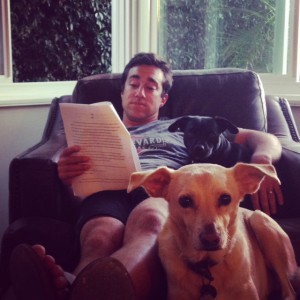 This is Chris reading my latest novel-in-progress. Well, actually, he was reading it and then stopped and I said, “Wait, read it again. I want to take a picture for the blog!” The dogs are there for moral support.
This is Chris reading my latest novel-in-progress. Well, actually, he was reading it and then stopped and I said, “Wait, read it again. I want to take a picture for the blog!” The dogs are there for moral support.What’s the best part of being married to a writer?
The celebrity! (I’m pretty sure he’s saying this sarcastically.) Amazon reviews, book tours, articles in the paper, strangers asking for Kim’s autograph. It’s been fun to hear from all the people that appreciate Kim’s work.
What are 3 things you’ve learned about the publishing industry via your wife’s experience?
Getting a book published can be a harrowing task. There are days of unbelievable excitement, but also days of horrific disappointment. (He gets it, he really gets it.)
1) There’s no money in writing (we were kind of hoping to be millionaires), so a writer had better appreciate the journey more than the destination.
2) The agent and publisher can make or break a writer’s career.
3) The success of a book can be more about who you know and being at the right place at the right time than about the quality of the story and the technical abilities of a writer.
Do you feel the desire to respond to any of your wife’s negative reviews on Amazon or Goodreads?
At first I did, but now I find most of the negative reviews to be funny. One person wrote, “I cannot recommend this book to anyone I care for.” Funny, right? (This came to me as a Facebook post and I really did think it was hilarious. I was going to write, “Can you recommend it to people you hate? Thanks!” but I decided to “go high,” per Hillary Clinton.) Lots of weird people out there, can’t please everyone. For the most part though, she’s received overwhelmingly positive reviews.
What advice would you give someone who is getting involved with a writer?
I don’t think all creatives are inherently poor at accepting criticism (umm . . . yes, we all are), but I would say that it must be tough for a writer to have his/her work be judged in such a subjective way. Just like with music or any other form of artwork, some people get it, some don’t, and most of the time the critiques have little to do with the writer’s technical abilities. In fact, a book’s success (if you use the number of copies sold as the main criteria for success) seems to have so little to do with the quality of the book and so much more to do with extraneous factors that are out of the writer’s control. For control freaks (and I’d imagine most introverted writers are control freaks) (that might be just me, but I’ll let him think it’s everyone), this must be maddening. So, be prepared to cheerlead, a lot. (Like, a lot.) Remind her of the successes.
Are you a reader?
Indeed. I read box scores all the time. (Ba da dum.)
Do you read all of your wife’s writing?
Usually multiple times. (This is true. I feel for the guy.)
How do you give your wife criticism?
Criticism? My writer is amazing! (I don’t often LOL, but when I do . . . ) One thing I try not to do is complain or criticize something unless I’m ready to get involved in finding a solution or at least make recommendations to fix it. (Pretty sure my therapist gave him this tip.) This said, I’m usually not bashful about expressing my opinions. (He’s not.) The delivery varies depending on my mood and the amount of patience I have in that moment. (Meaning, I shouldn’t ask him to read something when he’s tired.) I try to be respectful and sensitive (he really does), but it doesn’t always happen that way. (No, it’s just that I’m extremely oversensitive. Like I said, I feel for the guy. I’m so lucky to have him.)
The post An interview with my husband appeared first on Fiction Writing Blog.
October 11, 2016
A chat with Anita Hughes
When PEOPLE WHO KNEW ME was released in May, I realized I didn’t know much about the publishing industry. My publicist suggested I rebel against my introverted tendencies and talk to other authors to get their take on the business of writing. Thankfully, there are quite a few authors in southern California. There’s even one who lives ten minutes away from me–Anita Hughes.
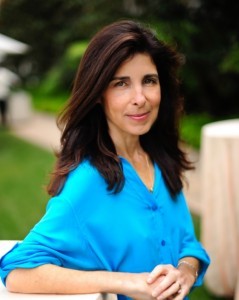 Anita was my first author coffee date. I liked her immediately. I was nervous that wouldn’t be the case, nervous that the conversation would be awkward. The opposite was true. In fact, when our time was up, we both wanted to keep talking…so we’ve been meeting up on a regular basis.
Anita was my first author coffee date. I liked her immediately. I was nervous that wouldn’t be the case, nervous that the conversation would be awkward. The opposite was true. In fact, when our time was up, we both wanted to keep talking…so we’ve been meeting up on a regular basis.
Anita is with the same publisher as me–St. Martin’s Press. Since 2012, she’s had eight books published. EIGHT. Her latest is CHRISTMAS IN PARIS, a charming story about love lost and found in the city of lights. I asked her some questions about her prolific writing and here’s what she had to say:
Since 2012, you’ve released eight books. And I know you have a few more in the queue. Does the pace of your writing career come with a certain pressure, or is it a motivating force that keeps you coming back to the computer every day?
CHRISTMAS IN PARIS is my eighth book and I have another book coming out next April, WHITE SAND, BLUE SEA and next August, EMERALD COAST. I think the faster pace comes with the same pressure no matter how many books I release. I want each book to be the best it can be and for people to really like it. I enjoy the actual writing process, so I like writing under contract. At least then my family thinks I have a proper job!
Speaking of “every day,” I’ve heard you say that you aim to write about 1,000 words per day. What is the biggest “threat” to your daily word goal?
The biggest threat to my daily word goal is not writing in the morning. If I write as soon as I wake up, no matter what else happens during the day, I can always get back to it. But I need to start the process to keep it going. I usually take one day off a week because I never want to write tired. I like to refresh myself with a good movie or the Sunday New York Times.
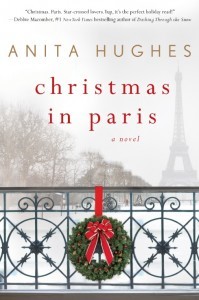 CHRISTMAS IN PARIS is your newest novel. Have you always wanted to write a Christmas-themed story, or did the idea just come to you? How would you describe the book in one sentence?
CHRISTMAS IN PARIS is your newest novel. Have you always wanted to write a Christmas-themed story, or did the idea just come to you? How would you describe the book in one sentence?
CHRISTMAS IN PARIS is about believing in love and in a little bit of magic. I hadn’t really thought about a Christmas story but I have always loved Paris. So the two ideas came together at the same time. And now I’m addicted to Christmas stories. They can be a little lighter than a normal book, and I love writing about festive foods and clothes and decorations.
I know you outline your books before you write them. Do you find outlines confining or liberating?
I really like outlining. I write a ten page synopsis for my publisher and it’s a great way to know that the story has a good beginning and middle and ending. As long as I keep coming back to the synopsis (even if I add and change things along the way), I can’t go wrong.
Of all the books you’ve written, which is your favorite? Why?
That’s a hard question, having written ten! I love CHRISTMAS IN PARIS because Alec might be my favorite character. He is funny and self-deprecating. And I love Gus, the imaginary dog. I also loved the relationship between Yvette and Bertrand in FRENCH COAST, and I loved writing about Audrey Hepburn in ROME IN LOVE.
You write about so many exotic destinations. How much of the writing is based on personal experience of those places, and how much is based on research?
I traveled to Europe a lot when I was younger, but these days much of it is based on research. But I truly try to capture the flavor of each place I write about.
You have 5 children. Many writers lament that it’s difficult to write with children in the house. What are your thoughts? Are any of your children writers?
So far there aren’t any children writers in the house! I do think it must be hard to write when young children are around, because there is so much as a parent that you don’t want to miss. My youngest two are now in high school so it’s fairly easy to balance everything.
What would be your advice to a new writer looking to get published?
My advice is the same as many writers, I think. Write a book that you want to read. Work very hard at finding an agent – don’t be afraid to query a lot of agents. Taste is so individual and it only takes one!
What do you wish you had known before publishing your first book?
I’m glad I didn’t know anything before I published my first book! I think it takes a lot of courage to write a first book and it’s best if you write it for yourself. Then, if it gets published it is a huge bonus.
What’s the best part of being a writer? The worst?
The best part about being a writer is creating characters and their worlds. I really live in their world while I’m writing and miss it when I’m finished (much like when I read). The worst part is hoping and worrying that other people enjoy my books!
The post A chat with Anita Hughes appeared first on Fiction Writing Blog.

